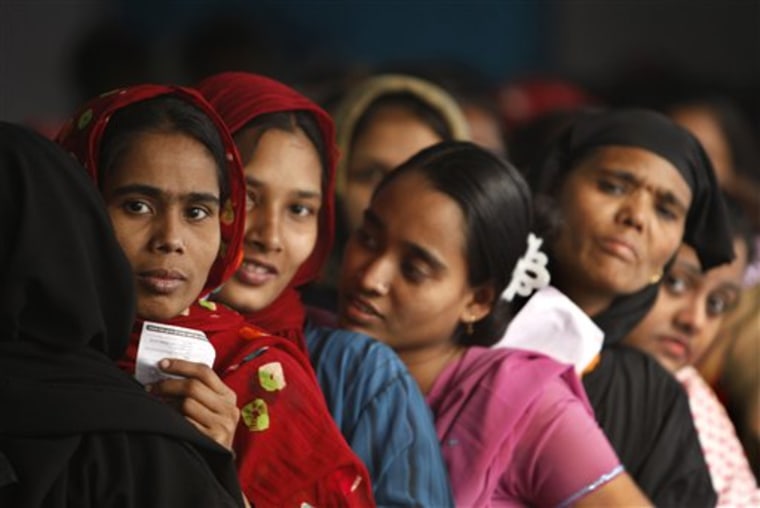Former Prime Minister Sheikh Hasina's political alliance won a landslide victory in elections aimed at restoring democracy to the troubled South Asian nation, an election official said Tuesday.
Election official Humayun Kabir said Hasina's alliance won a two-thirds majority in Parliament in Monday's elections after votes in most districts had been tallied.
"This has been a very free and fair election," Kabir said on Channel-i television.
But as votes were counted Monday night, the main rival party, led by Khaleda Zia, launched allegations of irregularities and forgery.
The voting marked the country's first election in seven years, but with no fresh faces — and with both leading candidates facing corruption charges — many feared the vote would just mean a return to the corruption, mismanagement and paralyzing protests of previous attempts at democracy.
Hasina and Zia are heirs to Bangladeshi political dynasties and fixtures of the political scene. Zia was elected prime minister in 1991, Hasina in 1996, and Zia again in 2001.
Though bitter rivals, their parties campaigned on similar platforms of reducing corruption and controlling inflation. One of the few policy differences is that Hasina's party is seen as relatively secular and liberal, while Zia has allies among Islamic fundamentalists.
Kabir did not give any figures, but private television station Ekuskey reported earlier Tuesday that unofficial tallies gave the coalition led by Hasina's Bangladesh Awami League 255 seats, far ahead of the 32 seats netted by Zia's.
The reports say that independents and small parties have won five seats, and that Hasina's alliance is leading in most of the remaining seats.
Security was tight and voting was the most peaceful in decades — a stark contrast to the failed elections of 2007, which dissolved into street riots and prompted a military-backed interim government to take over.
Voter turnout was high
Voter turnout was high, with about 70 percent of the 81 million eligible voters casting ballots, said election official Humayun Kabir.
"I'm here to choose the right person to lead our country," said S.A. Quader, a 57-year-old businessman who voted in Dhaka. "I'm confident the election will be free and fair."
Both of the leading candidates, Zia and Hasina, are facing corruption charges. The two, both heirs to Bangladeshi political dynasties, have traded power back and forth for 15 years in successive governments.
"Apparently parliamentary democracy is on the march again," said Mizanur Rahman Shelley, a political analyst and head of Center for Development Research of Bangladesh. "But doubt remains whether it solves the old problems."
Security to prevent fraud, violence
More than 650,000 police officers and soldiers had been deployed across the country in a bid to prevent voter fraud and the violence that marred the last attempt at a national vote.
To prevent cheating this time around, the interim government compiled a new electoral roll including voters' photographs. Some 200,000 election observers, including more than 2,000 foreign ones, monitored voting nationwide.
Last year, both Zia and Hasina were jailed on corruption charges, which they dismissed as politically motivated. They were freed on bail and reassumed positions as the heads of their respective parties, the two largest in the country.
Despite the flaws, analysts said a return to democracy provided the only chance to deal with Bangladesh's myriad problems of corruption, poverty, unemployment, inflation and terrorism.
"Democracy and free and fair elections are the only effective instruments for solving the problems facing the nation," said Shelley.
More on Bangladesh
